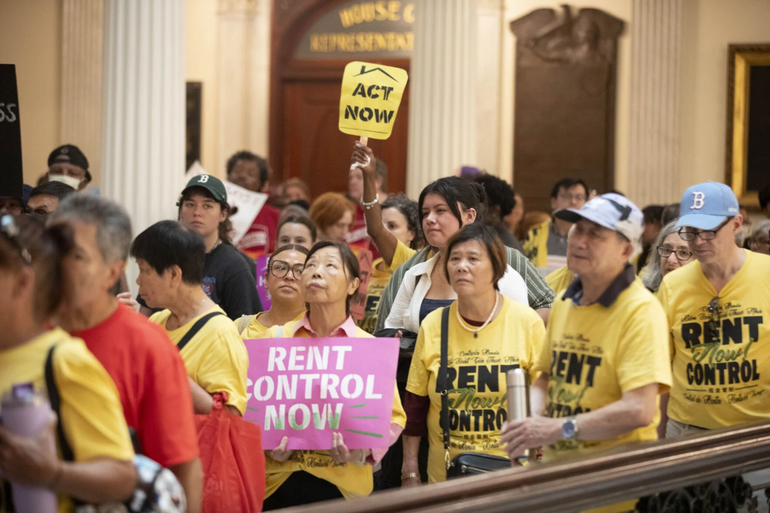Bay Staters might have the chance next year to vote on a proposed law to limit rent increases.
Members of Homes for All Mass, a coalition of housing groups across the state, plan to file an initiative petition with Attorney General Andrea Campbell’s office Wednesday, with 5 p.m. marking the deadline for ballot question backers to submit signatures and proposed language needed to start of a lengthy process.
Hundreds of advocates flooded the State House last week for a rally organized by Homes for All Mass, ahead of a legislative hearing that featured a rent stabilization proposal. Supporters say the measure could deliver immediate relief to some residents while new housing units are produced under a major 2024 housing law.
The initiative petition would similarly limit annual rent increases to the cost of living with a 5% cap, according to a Homes for All Mass advisory. There would be exemptions for owner-occupied buildings with four or fewer units, plus new buildings for the first decade.
The cost of living increase last year was 2.9%, which would have been the allowable maximum rent increase in 2025 if the proposed measure had been in place. In 2022, the cost of living increase was 8%, but the measure would have restricted the rent boost to 5%.
“Massive rent hikes are pushing seniors out of the homes they’ve lived in for decades, and making it impossible for young families to save money for a down payment on their first house,” Noemi Ramos, executive director of New England Community Project, said in a statement. “As the state works to build more affordable housing over the coming years, we need rent stabilization to protect workers, families, and seniors from out-of-control housing costs today.”
Rent control was banned in Massachusetts through a 1994 ballot referendum, and the Legislature over the years has shown little interest in reinstituting the policy. The majority of renters struggle to afford their rent, according to Harvard University’s Joint Center for Housing Studies.
“Rent stabilization is critical because rents are going up so quickly, and people need relief immediately,” said Annie Gordon, a resident of the Fairlawn Estates in Mattapan. “Having lived at Fairlawn for 50 years, I was there when we had rent control up until 1994, and I saw the stability it created for my community and the city. Then, after it was banned, I saw huge rent increases, apartments that weren’t well maintained, stress, fear, homelessness, and evictions.”
Advocates say the potential ballot question could halt corporate landlords from imposing steep rent hikes, though the policy is likely to attract strong opposition from the real estate lobby.
At the hearing last week, landlords with the Small Property Owners Association argued rent stabilization bills are not the answer to the state’s housing problems.
“This bill may be well-intentioned, but the outcome will have fewer available units, deteriorating housing conditions, and owners walking away from reinvestment in all the housing stock that needs care,” Tony Lopes, who spoke on the SPOA panel, told lawmakers. “And it penalizes the small property owners who make up 60% or more of [the] commonwealth’s rental market, including the immigrant and minority property owners who are seeking just to get ahead. We need to consider real solutions, zoning reform, more state-level housing production, and accountability for the rising cost of insurance.”
By the close of business Wednesday, initiative petition texts and signatures from 10 registered voters must be submitted to Campbell’s office. After a review, the AG typically makes certification decisions regarding which proposals are ballot eligible by the first Wednesday in September. Backers must then collect 74,574 signatures from registered voters and file them with local elections officials for certification by Nov. 19.

